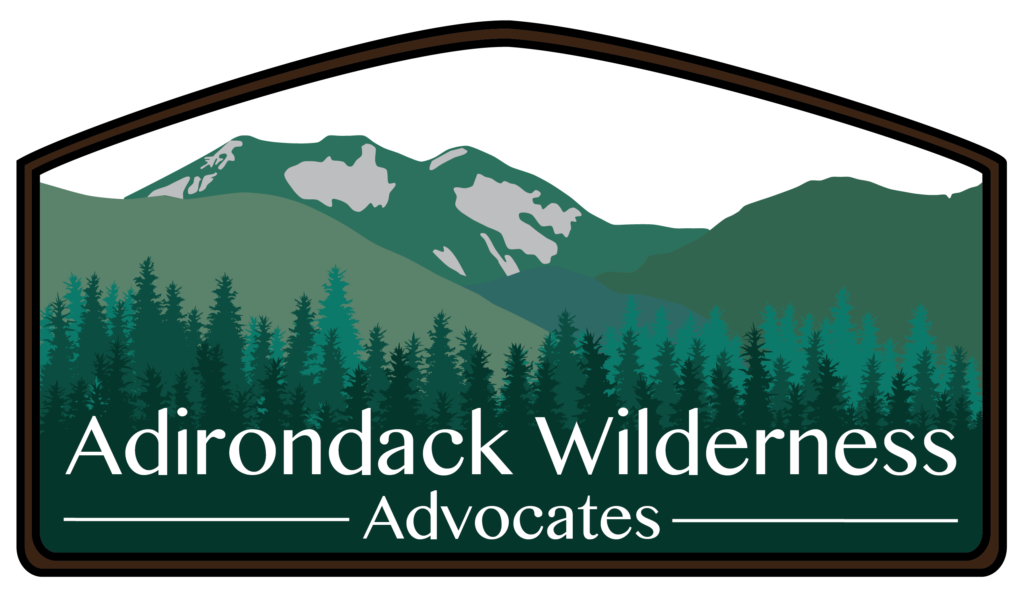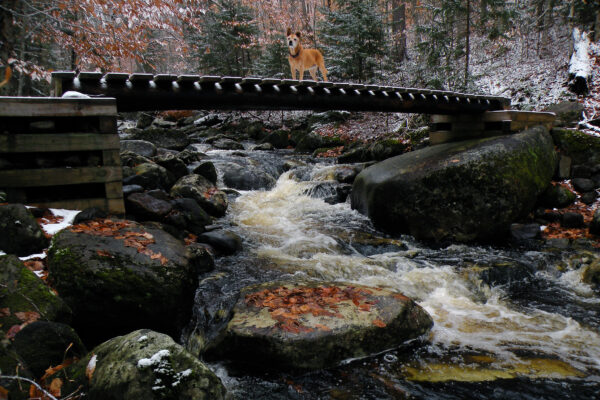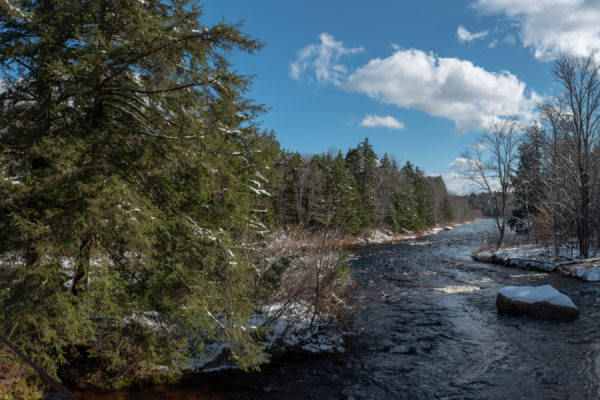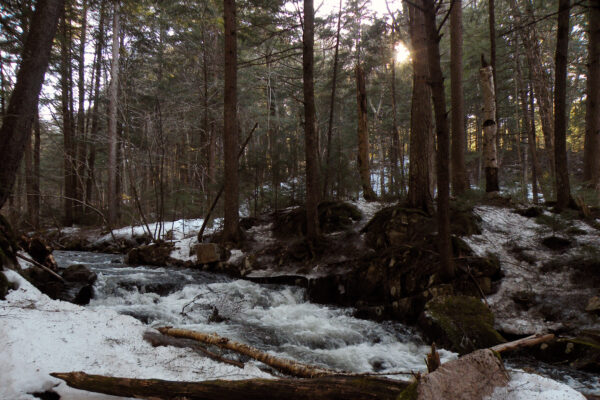July 2002
A patch of spruce blocks my way to the edge of the pond. The stand isn’t thick, but the dead lower branches point toward each other like bars on a turnstile, daring me to pass through untouched. I rotate my torso, but my knapsack does not make my profile any narrower. The bare, brittle twigs scratch at my shirt, a friction that slows me for a few seconds, while Purdy easily passes below the lowest branches and reaches the water first. The tips of some of the twigs snap off as I push my way through, but then I move past their reach and join her on the wide, grassy shoreline.
We are standing at the west end of the pond, which is roughly oblong in shape; from this end it appears that we can see nearly the entire surface. The view is not bad. Only the far east end is concealed by a minor bulge in the southern shoreline, the way the curve of the planet makes it impossible to see all the way across a sea. Purdy is sending out concentric rings across the water as she slakes her thirst. My first impression is that this is one of those shallow bodies of water perfect for dragonflies and lizards, but less so for loons and fish: wild, natural, intrinsically pretty, but not necessarily picturesque. Still, it is a place I have been curious to see and I am glad we have made the hour-long effort to get here today.
A stout spruce log has fallen obliquely across the shoreline, what had once been one of the larger trees from the edge of the forest—and perhaps the parent of the smaller trees I have just dealt with. Much of its bark has sloughed away long ago, exposing the smoother surface of rotting wood underneath. This will make a fine seat for me, so I settle down and pull my canteen out from the knapsack. There is not much water left in it, and I don’t feel inspired to refill it here. When Purdy sees that I am sitting, she rests her back end too on a piece of dry ground. Her ears are still perked outward, and her eyes are almost closed as she contentedly sniffs the air. There is no breeze; the air is notably calm.
This near end of the pond, the outlet end, is somewhat diminished in size by a boggy island that extends side to side more than half the distance between the north and south shorelines. A fallen log that had somehow been stranded out in the shallows, several yards from shore, now supports a small shrub with fiery pink blossoms—sheep laurel, for sure, its color perhaps heightened by the bright-red midday sun, colored as it is by the filtering haze.
Purdy has apparently accepted this as a tolerable place to stop for a while, because now she has lowered her front end to the ground too, primly crossing her front legs. Her back end is gracefully curved to conceal the fact of the missing leg. Her head is still up, but her eyes are slowly closing. I know she is doing well if she can settle into a nap like this, allowing it to creep up on her rather than collapsing into it from exhaustion.
On the hike up from the valley I habitually looked backward to see how she was doing, and she seemed to be content with the pace I had been setting. A senior dog reaches her physical limitations so easily, especially in warm weather, and it is my job to constantly assess what those limits might be on any given day. There have been a few cases in the past when I have overestimated her stamina, but for the most part Purdy keeps me honest: with her around our daily range is limited to just a few miles, and camping trips always include plenty of down time.
But today my concerns are probably unfounded. The fact that we are here, now, doing this side trip was partly her idea, actually. Behind us, on the banks of a nearby creek, we have a campsite set up beneath two tall spruce trees. The book I have been reading is now sitting on my sleeping bag awaiting my return. We spent most of the morning relaxing in the tent, and it was only when Purdy became antsy from inactivity that I knew we were ready for a hike.
It has been a good day so far. The sky is hazy, yes, but it often is in summer and I have not really thought much of it. A few juncos, which I can easily identify by their gray bodies and white bellies, are watching us from nearby branches, almost the way chickadees will come in for a closer look when I’m snowshoeing in the winter. They are being relatively quiet, but still they are the liveliest things around besides the handful of bugs. Out on the boggy island I can clearly see a scattering of nodding flowers. They are raised like flags out of the sedges, one each per cluster of pitcher plants. The pitchers themselves are concealed, but the blackish flowers stick out like flies circling a carcass.
What has me puzzled, though, is the smell of smoke. It is clear and distinct, like there is a campfire nearby—and people tending that fire, concealed somewhere in this forest. I turn my head to listen for voices, but there is little to hear on this windless day other than the buzzes and chirps of random, distant birds. Could there possibly be another person out this way, someone who leapfrogged us deeper into the woods? When I selected our waterside campsite last night I was satisfied we were sufficiently out of the way, farther into the backcountry than anyone else, and that we had found a place on this holiday weekend where it was unlikely anyone would find us. If someone is camping here, they have probably reached the same conclusion about their site—making us the intruders.
No, I don’t hear anyone, although it is possible that the resident of this hypothetical campsite is asleep on this peaceful day. Someone told me once—one of the few people I know who has ever been here before—that he found a small outpost constructed out of nylon tarps somewhere near this pond years ago. I don’t recall the details of where exactly along the shoreline that site was supposed to be, but the point is that it is not too far-fetched that another human could be present now.
I know that this is not a smell that I have imported with me, the lingering aroma of a former campfire I have been carrying in the fabric of my clothing. I know because I rarely ever have campfires on any of my trips. It could be, though, just my imagination—the way there are odd moments at work when I swear I can smell the woods. I can be standing over the photocopy machine, lost in thought, and there it is in the air, the smell of balsam fir. I know even as I smell it that is just a phantom, some overactive memory playing games with my senses, because there are no balsam fir stands in South Utica that I’ve ever seen. And even if there were, there is no way the scent could penetrate that brick building anyhow.
Or for all I know I am just somehow picking up a scent that has traveled miles to get here, something wafting over the woods from someone’s festive bonfire in Arietta. I think this is more likely. Although I swear I can distinctly smell the smoke, there is nothing rising anywhere from around the shoreline. All around the pond I see nothing but an unblemished expanse of trees, all of them rising upward toward a blank sky. For that matter, now that I think about it, there are not even any dead spruce trees, like I have been finding elsewhere throughout this region: mature trees that have been inexplicably shedding their needles and dying where they stand, despite no outward show of trauma or illness (at least, not that my amateur eyes can detect). I noticed some of these skeletonized trees yesterday hiking alongside the river, but there is no sign of such a dieback here.
The longer I remain motionless, however, the better target I am becoming for the mosquitoes, though frankly they haven’t been as bad here as they are back by the creek. My long-sleeved clothing leaves only my hands, head and neck exposed, and that is a small enough territory to protect; I am happy to swat and shoo away what few pests have been landing on me. Mosquitoes are slow and predictable anyway, and in small quantities I can easily deal with them. It’s only when they come in platoons and squadrons and hordes that they become obnoxious, making my skin crawl and my hair bristle just at the sound of the polyphonic buzzing.
But it is the presence of two mosquitoes that is now snapping me out of my contemplative reverie. One is hovering near my ear, distracting me with its annoying zzzzzzeeeeeeeeee while a quieter and stealthier cohort looks for the quickest way to my flesh. I can’t see the first, and the second is moving too fast. I try to swat it, or to at least shove it back out of my space, but the sudden wave of my hand gets Purdy’s attention. Perhaps thinking that I was gesturing to her, she looks to see what I am up to. The spell of her nap has been broken. And now I am noticing the log is no longer a comfortable place to sit, with my butt getting sore and my back getting tired for lack of a backrest. Oh, and if we want lunch today we have to return to camp because I’ve brought no food on what was supposed to just be a short side trip.
So I stand up, and Purdy stretches and stands up too, and I shrug my light pack back onto my shoulders, and the two of us set off to see what lies around the corner of the pond. The open shoreline does not extend all the way around the water, but there is at least a generous amount of it here at this end. It takes no effort at all to clear the northwest corner, which brings us to a place where I am able to get a better view of that bog island. From this angle I can now see some of the pitchers—arrays of them, tubular leaves spreading out from a common base, somewhat more like organ pipes than ewers of water. And each cluster is sitting under the gaze of its own meat-red flower.
The shoreline narrows beyond this point, with the spruce and hemlock trees now starting to meet the water. If we were to continue circling around the pond—which I’m not sure I want to do—then we’d have to duck into the woods now. At any rate, proceeding any further along the north shore will take us further away from camp.
We have to reenter the woods sooner or later anyway, so after taking one last look at the pond we pass through a gap in the hemlock trees. While we are here I want to look briefly for that hidden campsite, either the one that was producing the wood smoke or the tarp cabin that my friend had found—or both if they should prove to be the same site. I had been looking at my map trying to determine where along the shoreline the best place for such a campsite might be while I had been sitting on the log. This corner here made my list, but I don’t see anything—and not because the woods are too thick. Hobblebush is the chief obscuring agent here, and the wiry stems that I see now are few in number and no higher than my knee. The large round leaves are gratefully absorbing whatever sunlight the larger hardwoods are permitting to reach the forest floor, which is not much on this dimly lit day. Among all this natural growth there is no evidence of any kind of camping, past or present, anywhere that I can see: no blue tarps, no nylon tents, no old barbecue grills, no rusty pans—just a natural, unblemished forest.
Still, the smell of smoke remains, although it now seems to be everywhere, and not just a single column with a specific point of origin. It must just be one of those things, an occurrence that I will never fully explain and shouldn’t waste any more time on. I’m satisfied at any rate that its source is not at this pond.
Purdy sits back down while she waits for me to determine where to go next. I consult my map and see that we can head due west through a notch directly back to camp from here, a route that will be shorter than the one we followed up from the valley. I adjust the compass accordingly, and then we strike off in that direction.
Forest fires burn out of control in Quebec
Smoke blankets eastern United States
Sunday, July 7, 2002
MONTREAL – A vast region of forest continued to burn Saturday in Quebec, and smoke from the fires spread across a large swath of the northeastern United States as far south as Washington, D.C.
Some 250,000 acres of forest have been destroyed in at least 85 separate fires, and 10 of the blazes were described by the provincial forest fire protection service as being out of control.
More than 500 firefighters on the ground and in the air have been struggling to contain the blazes, but some were too big to control.
Officials report that some firefighters have been pulled back due to the intensity of the blazes. The smoke was so thick pilots could not use planes to dump water.
The smoke column was rising 10,000 feet into the sky, and strong northerly winds blew it across the northeastern states in a plume stretching from Michigan to Massachusetts.
Lightning strikes are believed to have sparked the fires, which have been burning since July 2. Some of the fires forced the evacuation of two Cree Indian villages, Nemaska and Chisasibi.
No rain is forecasted for several days, therefore the fires will likely grow.



